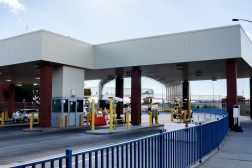CBP successfully tested an ‘interoperable’ blockchain system for protecting intellectual property

Customs and Border Protection recently completed an interoperable blockchain proof of concept to prevent the theft of intellectual property rights, the agency announced Friday.
Blockchains function as tamper-evident, digital ledgers implemented in a distributed fashion, and in this case the technology allows CBP to protect sensitive information on U.S. imports.
Personally identifiable information and trade secrets can be transmitted between the agency, manufacturers, retailers, rights holders, and importers via encrypted keys on a single platform.
“We strongly believe blockchain will help the United States maintain a competitive edge in the worldwide competition to grow stronger, better, and more reliable ways of protecting our country from illegal imports and exports,” a CBP spokesperson told FedScoop.
CBP completed its first-ever test of the technology in September 2018 within the North American and Central American free trade agreements — proving multiple blockchain programs could integrate seamlessly. Since then, the agency has explored additional use cases with a total of seven unnamed companies.
No real products were tracked, companies instead submitting fictitious transactions during piloting. But using a single access point in the blockchain, CBP was able to connect data to products and licenses correctly — necessitating fewer physical examinations.
The companies communicated with CBP and other transaction participants using unique blockchains, regardless of their software. That way new trade partners can be added to the interoperable system quickly without blockchains needing to be rebuilt, which saves everyone involved money.
The Department of Homeland Security Science & Technology Directorate funded the pilot — run by the Office of Trade — as part of its blockchain portfolio.
“This pilot represents great potential for marrying new technology with our traditional trade mission: to protect the U.S. economy,” said Brenda Smith, executive assistant commissioner of the Office of Trade, in a statement.
While many in government are eager to try blockchain to solve complex issues, many also resist that urger, worried that the technology doesn’t fit well in the government context. FedScoop reported last year about what it is about blockchain in government that irks many people.




